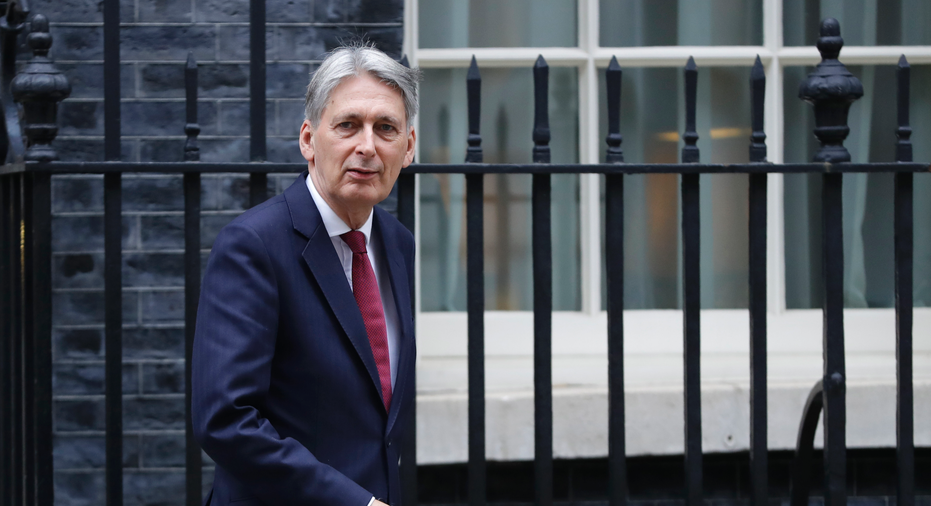UK central bank warns of deep recession without Brexit deal
Governor of the Bank of England Mark Carney hosts a Financial Stability Report press conference at the Bank of England in central London, Wednesday Nov. 28, 2018. (Daniel Leal-Olivas / Pool via AP)
LONDON – Leaving the European Union without a divorce deal could plunge Britain into its deepest recession in nearly a century, with the economy shrinking 8 percent within months as unemployment and inflation soar, the Bank of England warned Wednesday.
The stark projection came the same day the government's own economists said the country will be poorer after Brexit than if it had stayed in the EU, no matter what sort of trade deal it secures with the bloc.
Britain and the EU have agreed on a deal for the U.K.'s smooth exit in March. But British lawmakers are threatening to derail it, and Prime Minister Theresa May is battling to persuade them to support her agreement when Parliament votes next month.
May says that if Parliament rejects her deal, Britain could be headed for an economically disruptive "no deal" Brexit on March 29.
The central bank said that in a worst case scenario that could mean Britain's economy slumps far more than it had after the 2008 global financial crisis.
It predicted that in a no-deal scenario — with tariffs and other trade barriers, and no transition period to help businesses adapt — inflation would rise to almost 7 percent, unemployment would soar to 7.5 percent from 4.1 percent now, the pound would fall to near parity with the dollar and house prices would fall 30 percent.
"Our job is not to hope for the best but to prepare for the worst," said Bank of England Governor Mark Carney.
Despite the gloom the British economy faces in the event of a "disorderly and disruptive Brexit," he said the U.K. financial system was robust enough to weather the shock.
The central bank said that in the worst-case scenario, the economy would end up being between 4.75 percent and 7.75 percent smaller by the end of 2023 than in its most recent forecasts this month. And compared with the path projected before the June 2016 Brexit referendum, the bank said the economy could be 10.5 percent smaller.
However, the central bank said a strong trade deal with as few frictions as possible would mitigate the negative impact, especially if it is accompanied by a transition period to let businesses adapt.
May's agreement with the EU has factored in a transition period through the end of 2020 that can be extended.
If Britain retains a "close economic partnership" with the EU, the bank said the economy will end up between 1.25 and 3.75 percent smaller by the end of 2023 compared with the trend growth rate registered before the Brexit vote.
Carney said British business is "not fully prepared for a cliff-edge Brexit," pointing to the lack of contingency plans and sparse knowledge in business about how to do customs declarations. The country, he said, will need time to adjust.
A separate government assessment released Wednesday estimated that a no-deal Brexit would leave the British economy up to 9.3 percent smaller after 15 years than if the country had remained in the EU.
If Britain and the EU maintain close relations on trade, GDP will be 0.6 percent lower than it otherwise would have been, economists from the Treasury and other government departments said.
May painted that as good news.
She told lawmakers that her Brexit agreement "is the best deal available for jobs and our economy, that allows us to honor the referendum and realize the opportunities of Brexit."
The government report did not analyze the specific Brexit deal May secured with the bloc last week. But it estimated that under similar terms, involving no tariffs but some non-tariff barriers to trade, the economic hit would be at the lower end of the range — a decline in GDP of between 2.5 percent and 3.9 percent compared with staying in the EU.
Independent experts have said that 3.9 percent of Britain's GDP will amount to about 100 billion pounds ($128 billion) a year by the 2030s.
"If you look at this purely from an economic point of view, there will be a cost to leaving the European Union, because there will be impediments to our trade," said Treasury chief Philip Hammond.
Supporters of Brexit argue that leaving the EU will bring economic benefits that these estimates do not show, such as the power to control immigration and to strike new trade deals around the world.
Richard Tice of the pro-Brexit lobby group Leave Means Leave said "the Treasury has a woeful track record of forecasting" and the assessment should not be taken seriously.
The Bank of England had issued dire economic predictions before the 2016 Brexit vote and while the pound did fall sharply, the country avoided a recession.
Some pro-Brexit economists say the U.K. would get an economic boost from leaving the EU without a deal, as it would be free to slash taxes, tariffs and regulations. But they are in a minority among economists.
The government assessment agrees that May's deal is better than leaving with no deal. But the analysis also makes clear that May's determination to restrict immigration from the EU — a major issue for many Britons who voted to leave — will worsen the economic impact of Brexit.
The government analysis also says new trade deals would do little to offset the economic damage done by Brexit. It estimates that deals with the United States, China and other countries would add only 0.2 percent to GDP after 15 years.
Scottish National Party lawmaker Ian Blackford said May's "head is in the sand" about the impact of Brexit.
"No government should choose to weaken its economy and make its citizens poorer," he said.
___
See the AP's Brexit coverage at: https://www.apnews.com/Brexit





















